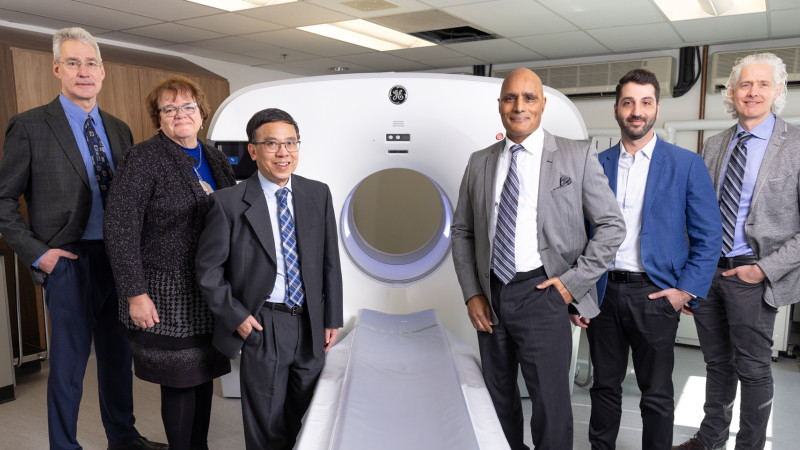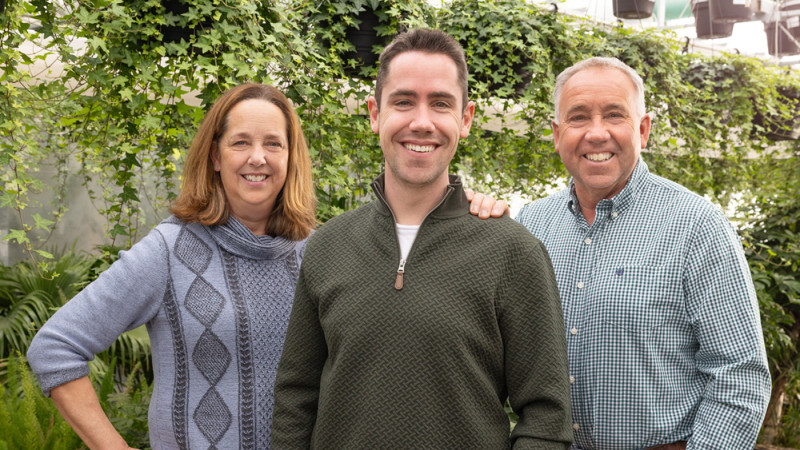In the right hands at the right time
For anyone with a cervix age 25 and older, St. Joseph’s Health Care London, in collaboration with the South West Regional Cancer Program, hosted a unique, one-day only Pop-Up Pap Test Clinic – no appointment necessary.
Twenty years ago, during a routine physical and pap test, Tiffany Lukas had her first abnormal pap test result. She was positive for human papillomavirus (HPV), the primary cause of cervical cancer.
Tiffany had been receiving regular pap tests since age 16 but had not received the HPV vaccine as it wasn’t available yet. Fortunately, follow up pap tests showed the virus cleared on its own and no treatment was needed.
Eight years later, however, a routine pap test was again positive. Referred to gynecologist Dr. Robert Di Cecco at St. Joseph’s Health Care London, Tiffany was closely monitored for four years. No treatment was needed, the mild-grade abnormal cells resolved, and she was discharged from the Colposcopy Clinic. Tiffany returned to her family doctor for regular screening.
It would not be the end of her journey. In 2018, Tiffany’s routine pap test results showed abnormal cells for the third time and she returned to Dr. Di Cecco. In the Colposcopy Clinic at St. Joseph’s Hospital, Tiffany was assessed and underwent a minor procedure, which removed the abnormal cells. Lab results would later reveal she had a very early cancer of the cervix that, left untreated, would have progressed to a more advanced invasive cancer of the cervix requiring aggressive treatment. But diligence in screening meant Tiffany avoided that fate.
“The day I found out my cervix had microinvasive squamous cell carcinoma, the pre-cancer had already been removed from my body. I felt fear and relief all at the same time. As the news registered in my brain and my eyes began to water, Dr. Di Cecco said ‘there is no crying in colposcopy’,” Tiffany recalls with a laugh.
Each year, about 1,550 Canadians are diagnosed with cervical cancer and 400 will die from it. Yet cervical cancer can most often be prevented with regular cervical screening (pap test) and follow-up of abnormal results. People with a cervix include women, transmasculine and non-binary people.
A pap test, also called a pap smear, is an exam used to look for changes in cervical cells that may develop into cancer later. Cells are taken from the surface of the cervix and sent to a lab to be examined under a microscope. And on Jan. 29, St. Joseph’s, in collaboration with the South West Regional Cancer Program (SWRCP), made it easier than ever to get a pap test with a one-day only drop-in Pop-up Pap Test Clinic. No appointment necessary. Read about the tremendous "pap-ularity" of the clinic below.
Getting regular pap tests is critical in identifying early changes to cervical cells when they may be easier to treat, and when treatment can prevent cervical cancer from developing, explains Dr. Di Cecco, Medical Director of St. Joseph’s Colposcopy Clinic and Regional Lead for Cervical Screening for the SWRCP.
“Dealing with cancer of the cervix is a traumatic experience for the patient and their families. The treatments for cervical cancer can be very invasive and take a huge physical and emotional toll on the individual and their families. Success of those treatments depends on how early it’s caught. Timely screening allows for the detection of changes before they become cancerous – changes that place the individual at risk. The identification of pre-cancerous changes allows us to remove these abnormalities with minor procedures that do not result in a major upheaval to the individual’s life. This is why cervical cancer screening is so effective.”
Most cervical cancers are found in individuals who have never been screened or who have not been screened regularly, as recommended by Ontario’s cervical screening guidelines, adds Dr. DiCecco.
The Ontario Cervical Screening Program recommends pap tests for cervical cancer screening every three years for those at average risk. The screening is usually performed by family physicians and other care providers in the community. However, with one in five Canadians – about 6.5 million people – currently without a family doctor, many individuals are likely missing out on this important aspect of preventative care.
The Colposcopy Clinic at St. Joseph’s Hospital provides specialized cervical screening and care to those with abnormal pap results. People normally require a referral to the clinic but during the one-day Pop-Up Pap Test Clinic the doors were open for routine screening to anyone age 25 and older who had not had a pap test in the past three years – no referral or appointment is necessary. It was the first such clinic of its kind offered to the general public in the London area and it’s hoped it will become a model for additional pop-up clinics across the region, says Dr. Di Cecco.
“Given that there is a large group of people who do not have a primary care provider due to the shortage throughout the province, the drop-in clinic was an option for individuals to have a pap test if they are due and can’t get into their caregivers office or don’t have one,” says Dr. Di Cecco.
A pap test only takes a few minutes. An instrument called a speculum is inserted into the vagina. The speculum holds the walls of the vagina apart so that the doctor or nurse can clearly see the cervix. The doctor or nurse will then collect samples of the cervical cells using a soft brush and a flat scraping device called a spatula. There may be some discomfort or pressure during the procedure, but it is not usually painful. After a pap smear, the individual can go about their day without any restrictions.
“Screening is only effective if someone gets screened,” urges Dr. Di Cecco. “The opportunity for early identification of abnormal cells depends on active participation in the screening program.”
Tiffany required no additional treatment after the cancerous cells on her cervix were removed in the Colposcopy Clinic. However, a hysterectomy (removal of the cervix and uterus) was recommended as a preventative measure to ensure she remained clear of any further issues. With the cancer already gone, she was given the gift of time before the hysterectomy to become a mom.
Lucy Rose was born Jan. 19, 2020, delivered by Dr. Di Cecco, followed by Ruby Anna on March 9, 2022. In September of that year, Tiffany underwent a hysterectomy at London Health Sciences Centre and made a speedy recovery.
“I am beyond grateful for the care I received,” says Tiffany. “Dr. Di Cecco spared me from cancer and made it possible for me to have kids - a family. And yes, there is crying in colposcopy, but hopefully happy tears if you are fortunate enough to be in the right hands, at the right time.”
Pop-up clinic proves 'pap-ular'
A staggering turn-out for St. Joseph’s Health Care London's Pop-up Pap Test Clinic on Jan. 29 surpassed all expectations, indicating a tremendous need for easy access to cervical cancer screening and a desire for people to look after their health.
They began lining up before 9 am. By 9:30 am, the waiting room was full and people spilled out into the hallway. And they kept coming.
By the end of the day, a whopping 103 people had received pap tests at St. Joseph's Pop-up Pap Test Clinic – surpassing all expectations and calling for all hands on deck by Colposcopy Clinic staff and leaders, who stepped up and stepped in to make the day a success.
“It was overwhelming – I was not expecting these numbers – but it’s also gratifying that people took advantage of the clinic,” says Dr. Robert Di Cecco, Medical Director of the Colposcopy Clinic at St. Joseph's Hospital, who was quick to call in reinforcements as patients continued to file in. An energetic Dr. Kaysie Usher, a gynecologist at London Health Sciences Centre, answered the call and jumped to join the Colposcopy Clinic team as they bustled from one exam room to the other.
Karen Perkin, Vice President Patient Care and Chief Nurse Executive at St. Joseph's, praised the team for turning an idea into reality and for their extraordinary collective effort and flexibility in responding to the unexpected demand.
“By helping to meet a need that clearly exists in our community, I congratulate the team on truly living the values of our organization, which just may have changed the course of someone’s life.”
About 85 per cent of those coming to the clinic did not have a family doctor and almost all patients had missed out on the screening for five to as long as 15 years. Some patients said they had a family doctor who does not do pap tests.
“Most of those who came to our clinic had not had the screening for five, eight or 10 years – we just can’t let that happen,” says Dr. Di Cecco, who came up with the idea of the one-day pop-up clinic to raise awareness of cervical cancer, boost cervical cancer screening rates and provide an important service for people without a family doctor.
The clinic, open to anyone with a cervix age 25 and older who had not had a pap test for the past three years, was a pilot but the numbers indicate a tremendous need to offer more such opportunities for people to get screened, says Dr. Di Cecco.
In the waiting room of the popping pop-up clinic, there was an atmosphere of camaraderie and spirits were high as people waited patiently to be seen. Despite the longer-than-expected wait, much gratitude for the clinic was expressed by patients.
Paige Wall, 31, was among them. The mother of three had not had a pap test for 10 years and has not been able to find a family doctor since hers retired last year.
“Yes, it may be uncomfortable and awkward and weird to get a pap test, but it takes two minutes and I’d rather find out there’s a problem early than die of a cancer that could have been prevented,” says Paige, who decided the morning of the clinic to drop in.
The lack of a family doctor is a huge frustration for Paige as well as her mother, who recently underwent surgery, and her husband. None can find a physician and are relying on walk-in clinics.
“We’re just a number out there and there’s nothing we can do. It’s not like I can go to a walk-in clinic and ask for a routine pap test.”
The drop-in Pop-up Pap Test Clinic, organized in partnership with the SWRCP, was the first clinic of its kind offered to the general public in the London area.
Why get a pap?
It can take years – with no symptoms – for abnormal cells on the cervix to become cancerous. People with a cervix include women, transmasculine and non-binary people. Here’s what you need to know about cervical cancer and the importance of screening:
What screening can do for you
- Regular cervical cancer screening (every three years) with a pap test can identify abnormal cells that may become cancerous if left untreated. Finding pre-cancerous cells early, along with timely treatment, can prevent people from getting cancer. Treating pre-cancerous cells found by cervical screening is much easier than treating cancer and has a better chance of working than treating cancer after it develops.
- Pre-cancerous cells on the cervix do not have symptoms and can only be found with cervical screening.
- Most cervical cancers are found in people who have never been screened or have been screened less often than recommended by Ontario’s cervical screening guidelines.
- Screening works! Since the 1980s, the rate of new cervical cancer cases in Ontario has dropped significantly due to regular screening.
What causes cervical cancer
- The primary cause of cervical cancer is the human papillomavirus (HPV) of which there are many strains. HPV is sexually transmitted from one person to another. HPV infections are common and up to 80 percent of sexually active people will have an HPV infection in their lifetime. Most HPV infections resolve on their own without causing any harm. However, some HPV infections do not go away and can cause cellular changes in the cervix, which can lead to cervical cancer unless diagnosed early through screening and treated.
- Cervical cancer can affect people who have a cervix and have been sexually active at any point in their life.
- Exposure to HPV can occur at any time in one’s life and not be detected for many years before causing changes that are identified with a pap test.
Who should be screened
- The Ontario Cervical Screening Program recommends cervical screening every three years for people who…
- have a cervix
- are aged 25 to 69
- are or have ever been sexually active
- People still need to go for cervical screening even if they...
- feel healthy and have no symptoms
- are no longer sexually active
- have only had one partner
- are in a same-sex relationship
- have been through menopause
- have no family history of cervical cancer
- Have received the HPV vaccine
- Cervical screening can stop at age 70 if the individual has been regularly screened and had three or more normal cervical screening test results in the previous 10 years.
Learn more about cervical cancer screening








